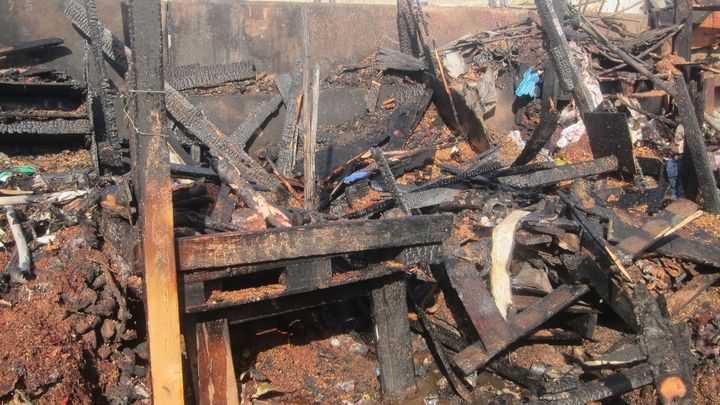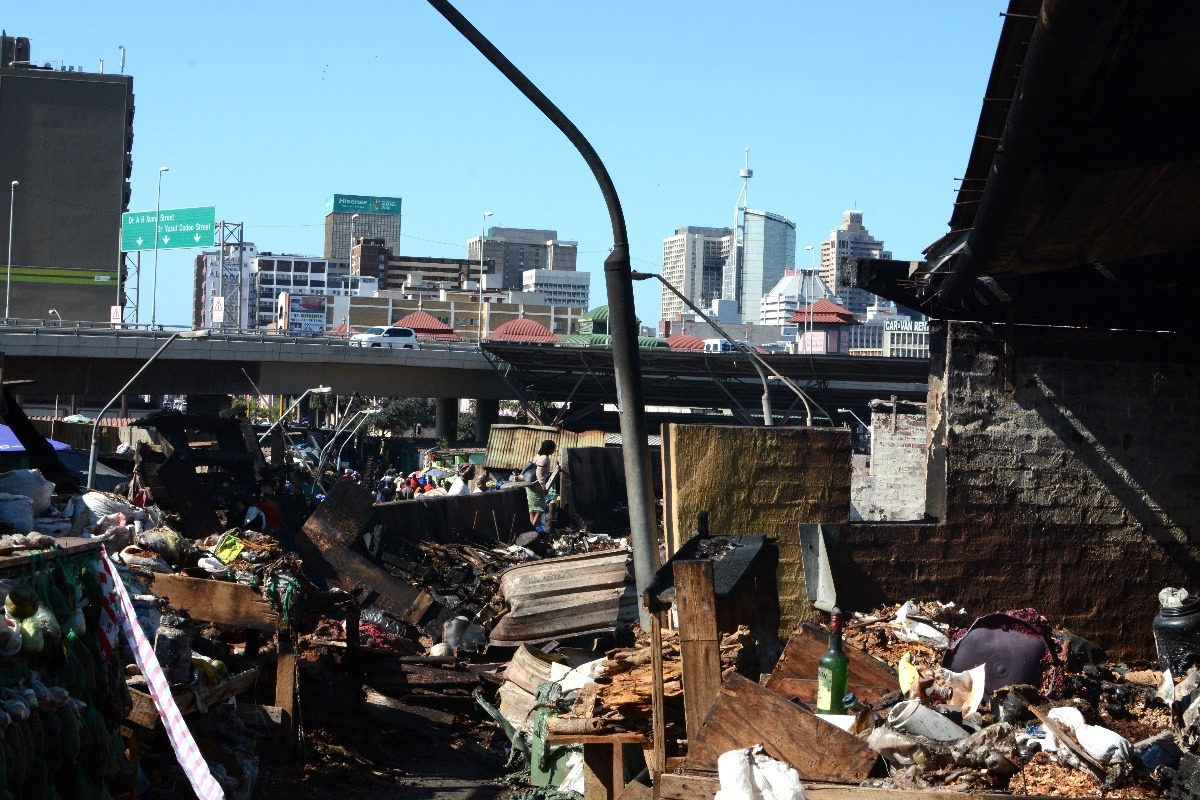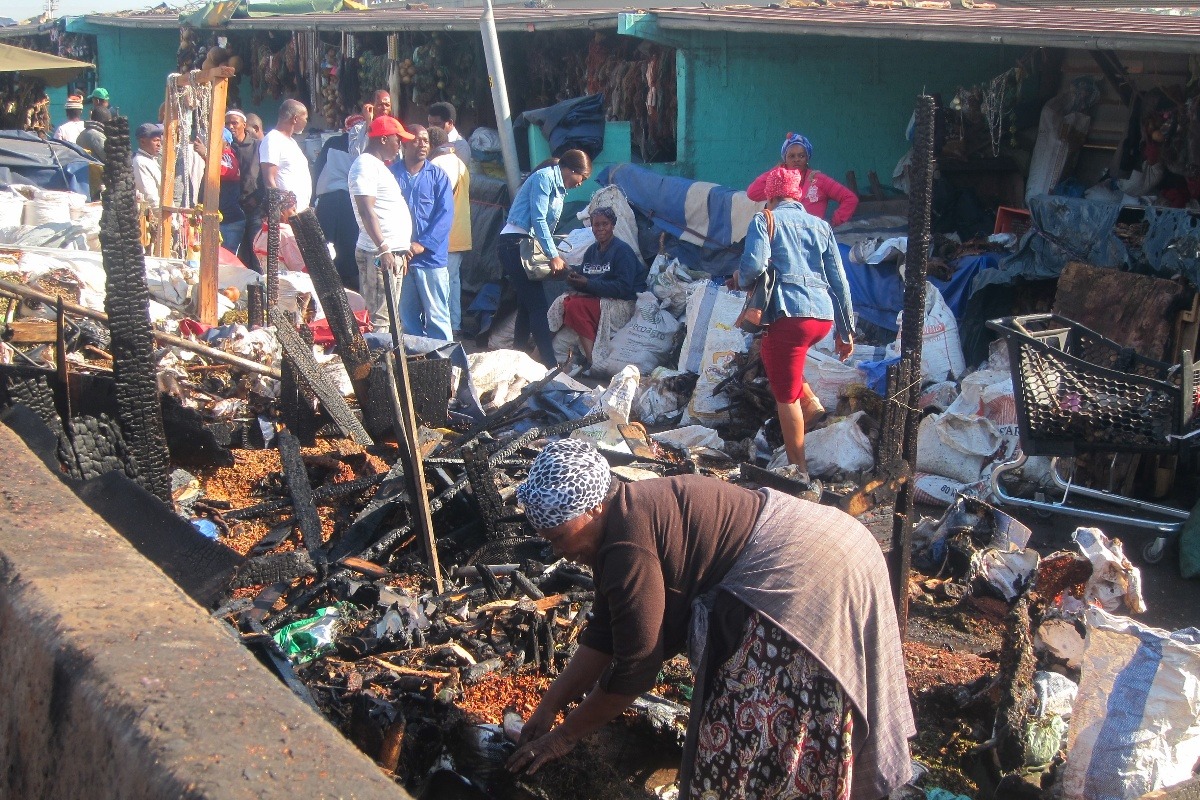
Warwick Junction Herb Market Fire
Donation protected
Late on the night of Sunday, July 29th a small fire started in the center of an informal traditional medicine marketplace in Durban, South Africa, torching the livelihoods of 77 traditional healers and medicine vendors and affecting the daily incomes of dozens of additional informal workers who support the market.
"I lost all my stock, and I worry I will lose my clients. When I prescribe something, they are doubting if I have all the ingredients, they can see that everything was burnt. It will take up to ten years to get back to normal, it has taken me over twenty years to get where I am now." Mr. Gumede, Chairperson of the Herb Market Committee



WHO WAS AFFECTED?
This formerly bustling traditional herb market is located within a complex network of informal markets in Warwick Junction in Durban. It supplies the City and the surrounding suburbs with the bulk of its indigenous medicines, which an estimated 80% of Africans living in South Africa rely on. While the conversion of an abandoned elevated roadway into this marketplace in 1998 brought dignity and increased visibility to this critical cultural practice after the oppression of apartheid, the livelihoods of healers in this space remain tenuous.

The 289 permitted traders source their medicine from foraged roots, bark and herbs, rare animal skins, feathers and bones that are controlled by regulations, weather patterns and their ability to pay or secure inventory on credit. A study found that there are 14,000 people involved in the supply chain for this marketplace who will all be effected by this fire. The inventory stored at the 77 stalls that burned last Sunday represented enough raw material to supply demand through the end of the year, an average of R18000 (roughly $1256) per vendor. It also included the monetary savings, identification documents and personal artifacts of the 77 informal workers and their dependents.
"It's like I was buried alive; I lost everything. The few roots I have saved from the fire people are reluctant to buy. Like a person selling fruits and vegetables: if you are table is packed full it shows you have choices; people are buying more as a gesture of support. For now I feel like I am coping." Ms. Mhlongo, Secretary of the Herb Market Committee


WHAT WILL THE FUNDS BE USED FOR?
All funds will be distributed directly to the informal workers to help pay off credit, restock inventory, rebuild stalls and replenish lost savings. The target of $550-$650 for each of the effected traders would allow them to start to rebuild.
With limited help from the municipal government, the traders cleared the fire debris within three days and began to reconstruct their stalls, which cost them R350 and can only accommodate the small, salvaged inventories found amongst the ashes. This rebuilding effort is a testament to the urgency with which these traders need to get back on their feet, but they are not in a position to fund this rebuilding themselves.

"I lost all my stock, and I worry I will lose my clients. When I prescribe something, they are doubting if I have all the ingredients, they can see that everything was burnt. It will take up to ten years to get back to normal, it has taken me over twenty years to get where I am now." Mr. Gumede, Chairperson of the Herb Market Committee



WHO WAS AFFECTED?
This formerly bustling traditional herb market is located within a complex network of informal markets in Warwick Junction in Durban. It supplies the City and the surrounding suburbs with the bulk of its indigenous medicines, which an estimated 80% of Africans living in South Africa rely on. While the conversion of an abandoned elevated roadway into this marketplace in 1998 brought dignity and increased visibility to this critical cultural practice after the oppression of apartheid, the livelihoods of healers in this space remain tenuous.

The 289 permitted traders source their medicine from foraged roots, bark and herbs, rare animal skins, feathers and bones that are controlled by regulations, weather patterns and their ability to pay or secure inventory on credit. A study found that there are 14,000 people involved in the supply chain for this marketplace who will all be effected by this fire. The inventory stored at the 77 stalls that burned last Sunday represented enough raw material to supply demand through the end of the year, an average of R18000 (roughly $1256) per vendor. It also included the monetary savings, identification documents and personal artifacts of the 77 informal workers and their dependents.
"It's like I was buried alive; I lost everything. The few roots I have saved from the fire people are reluctant to buy. Like a person selling fruits and vegetables: if you are table is packed full it shows you have choices; people are buying more as a gesture of support. For now I feel like I am coping." Ms. Mhlongo, Secretary of the Herb Market Committee


WHAT WILL THE FUNDS BE USED FOR?
All funds will be distributed directly to the informal workers to help pay off credit, restock inventory, rebuild stalls and replenish lost savings. The target of $550-$650 for each of the effected traders would allow them to start to rebuild.
With limited help from the municipal government, the traders cleared the fire debris within three days and began to reconstruct their stalls, which cost them R350 and can only accommodate the small, salvaged inventories found amongst the ashes. This rebuilding effort is a testament to the urgency with which these traders need to get back on their feet, but they are not in a position to fund this rebuilding themselves.

Organizer
Emily Alter
Organizer
Berkeley, CA